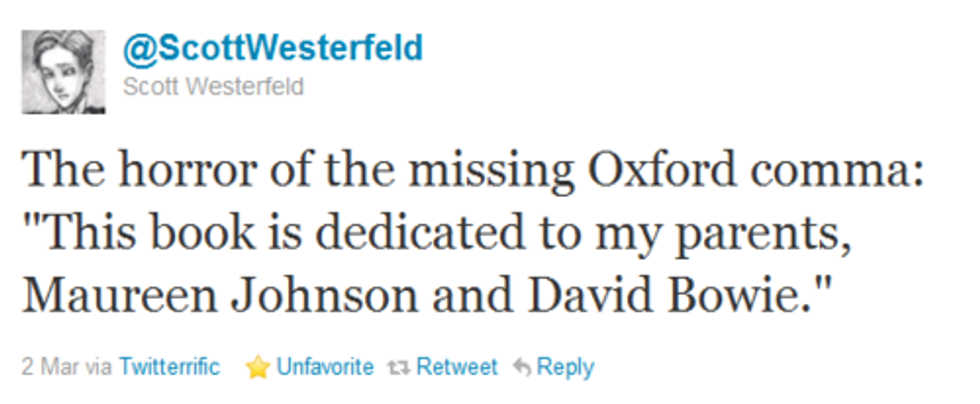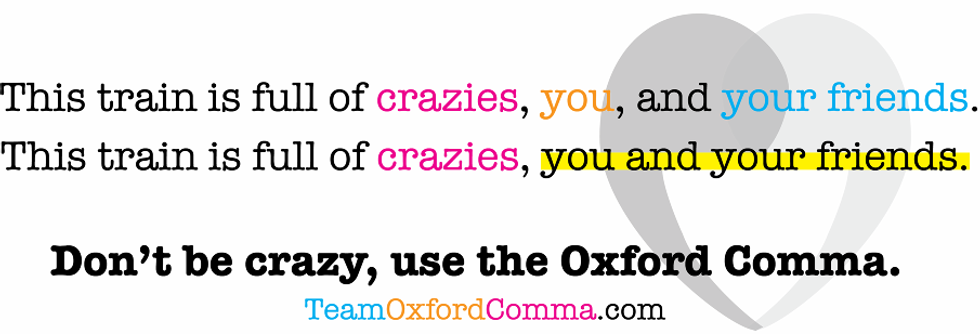The Oxford or "serial" comma is a source of contentious debates among English grammar nerds everywhere. Certain individuals say that it is unnecessary. However, adherents of everything that is right and good in this world say otherwise. Some people who do not use the Oxford comma are the writers for this website, Adolf Hitler and Satan.
You may have found that last sentence confusing—after all, Adolf Hitler and Satan are not writers for this website (they're too busy writing here). Rewriting the sentence as "some people who do not use the Oxford comma are the writers for this website, Adolf Hitler, and Satan" would have clarified that all three were different items in a list. If the sentence without that extra comma confused you, blame those in charge of Odyssey who made the brilliant executive decision to ban the Oxford comma from their website. Ironically, as an Odyssey writer, I am required to omit the Oxford comma from sentences in this article that are not specifically used as examples.
Recommended for you
So what exactly is the Oxford comma? Besides being the only hope of salvation for this forsaken website, it is a very useful tool that can clear up confusion in many circumstances. The actual definition of the Oxford comma is as follows. It is the final comma in a list of words or phrases that are separated by commas (it comes before the word "and").
Take the sentence "I ate pie, cake and cheese yesterday." Adding the Oxford comma gives us "I ate pie, cake, and cheese yesterday." The first sentence simply sounds awkward. As opposed to listing each item individually, with an equal amount of space between them, the sentence arbitrarily lumps the last two items together. This splits the sentence at a very strange point, so that it seems as if "I ate pie" and "cake and cheese yesterday" are two separate phrases.
While the difference between the two sentences may seem trivial in this example, there are many situations where the Oxford comma makes quite a bit of a difference. Take the basic formula "A, B(,) and C" where the capitalized letters represent words or phrases. When the Oxford comma is used, it is made very clear that all of the phrases are parts of a list. If the Oxford comma is removed, then there is another possibility: the first phrase could describe the second and third phrases.
Taking advantage of this ambiguity gives us hilarious results:
While most of those example sentences were created intentionally to demonstrate the issue, there are plenty of situations where equally hilarious sentences are written entirely by accident. For example, that last sentence about Nelson Mandela was from a description of a Peter Ustinov documentary in The Times of London. It was entirely unintentional. If you believe that the Oxford comma is unnecessary, then you believe that there is nothing wrong with that sentence.
That example was not an isolated incident, by the way. Here is another real-life example of the disastrous results of omitting the Oxford comma (which, strangely enough, also involves Nelson Mandela):
Interestingly, many people who prefer not to use the Oxford comma admit that they are wrong—at least indirectly. A survey by FiveThirtyEight asked 1,129 Americans about their opinions regarding the Oxford comma and their own grammar. Respondents who preferred the Oxford comma were much more likely to report having better grammar.
It also ought to be mentioned that one of the only reasons that omitting the Oxford comma has been standard practice in certain professions is that journalists like to save space, as described by Wilson Follet in "Modern American Usage: A Guide:" "What, then, are the arguments for omitting the last comma? Only one is cogent – the saving of space. In the narrow width of a newspaper column this saving counts for more than elsewhere, which is why the omission is so nearly universal in journalism. But here or anywhere one must question whether the advantage outweighs the confusion caused by the omission." One must especially question omission of the comma in any online medium such as Odyssey, where that advantage does not even exist.
So if you want to have good grammar, avoid embarrassing miscommunication and not be crazy, use the Oxford comma:
For more information on this subject, check out some of the following resources:
Brianna Abbott via Odyssey Online, "14 Reasons You Should Use The Oxford Comma"
The Daily Post, "The Oxford Comma"
Poynter, "AP Style should adopt the Oxford comma"
About Grammar, "What Is The Oxford (or Serial) Comma?"























